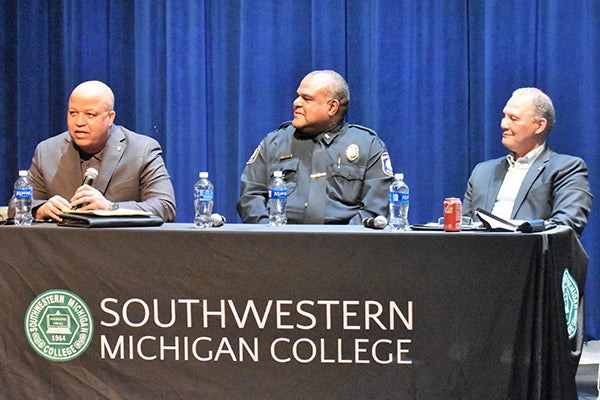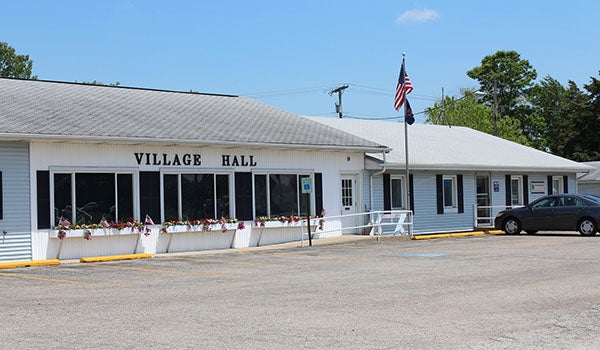‘Do the right thing’: George Grady’s impact as nation’s first Black police chief
Published 4:31 pm Friday, February 25, 2022
|
Getting your Trinity Audio player ready...
|
DOWAGIAC — Despite having died 45 years ago, one local figure’s legacy continues to inspire a generation of local African American law enforcement officers.
George Grady, Dowagiac native and the first Black police chief in the U.S., was one of the subjects of a collaboration event between Southwestern Michigan College and the Dowagiac Area History Museum on Thursday. The program, “Looking Back and Forward: Historic and Modern Issues Facing African Americans in Law Enforcement,” featured a panel discussion from Dowagiac High School graduates influenced by Grady’s trailblazing in their careers in policing.
The panel included former Michigan State Police officer and Grady’s son, Dennis Grady, as well as soon-to-be-retired Grand Rapids Police Chief Eric Payne and former Benton Harbor and Coloma Police Chief Randy Pompey.
The discussion ranged from the history of African American police officers and the barriers faced by historical and current officers, but the throughline of each panelist was their connection to each other and the inspiration they draw from George Grady.
Growing up with Chief
Dennis Grady said while doing research with DAHM Director Steve Arseneau, he discovered his father was not only the first Black police chief in the state, but in the United States.
After serving as a Navy diver in the Korean War, George Grady joined the Dowagiac Police Department in 1955. In 1965, he became chief of police, and served the city until 1974. He died Feb. 17, 1977.
“I know the reason why he died,” said Dennis Grady, who graduated from DUHS in 1975 and retired from the MSP in 2003. “It was the stress, and being the first Black chief of police, being the first black of anything. … Our house was like a mini police station, and it was hard. Our phone was ringing off the hook constantly.”
Grady said growing up the son of the first Black police chief had many impacts, from being watched constantly to threats of violence.
“Randy and Eric, we were good friends, but there were things I couldn’t even tell them,” Grady said. “They threatened to kidnap us as a family. One night our house got a big rock through the bedroom window. I still remember jumping up and running into the bedroom. My dad was at the window with his pistol and he fired like six shots down the street.
“I still remember my mom saying, ‘George, you’re going to kill somebody,’ and he said, ‘that’s what I’m trying to do.’”
Another time, Grady said he was mowing the lawn and saw a bullet hole in the house from people shooting at it.
“It was challenging, you know, as a young person just wanting to go to school,” Grady said. “I didn’t realize my dad was the first of anything. I just knew he was the chief of police and predominantly had an all-white force.”
Some nights, Grady would be awakened by his father in the middle of the night to teach him life lessons.
“When he looked me in my eyes, sometimes I would have to turn away … it was too intimidating,” Grady said. “He said, ‘you’re my son.’ He said, ‘do the right thing.’ He said, ‘even if you suffer for doing the right thing, it’s still the right thing.’ He said, ‘Treat people the way you want to be treated. I know you can handle that. … Alright, you can go back to bed.’ By that time, I’m so geeked up I don’t know what to do.”
One of the biggest lessons Grady said his father taught him was not seeing people for the color of their skin.
“I was trained to see character,” Grady said. “My dad said justice should be colorblind, so that when we went to school, we didn’t have these attitudes. … and we all tried to follow this as we became officers.”
Influence
Grady said he was reading his bible the other day and one particular verse jumped out at him, John 15:13. The verse states, “Greater love has no one than this: to lay down one’s life for one’s friends,” and Grady said that’s something his father instilled into him, Payne and Pompey.
Payne was a few years younger than Grady and Pompey – graduating from DUHS in 1982 – but grew up a few blocks from the Grady house and knew who the chief was.
“It wasn’t until later that I came to realize the importance of what Chief Grady meant at that time,” said Payne, who has 32 years with the Grand Rapids Police Department, and became the city’s first Black chief in 2019. “It was very impactful.”
Pompey, who graduated from Dowagiac with Grady in 1975, is an Air Force veteran and also the first Black pilot for the MSP.
“I’m honored to be here with these two guys – they could have chosen any profession they wanted and been successful, but they chose to serve their communities,” Pompey said. “Chief Grady for me wasn’t just Chief Grady, he was coach Grady. … If we messed up, Chief Grady would let you know about it.”
Dennis Grady and Pompey played on the same baseball team back in the day, and after one particular loss Pompey was upset about, coach Grady took him aside for a lesson.
“My head was pointing at the ground and I could barely move my feet because I was sad we lost,” he said. “Coach Grady stops me, puts his arm around me and points to the sky and says, ‘look at that. Look at that right there.’ Of course, I’m looking, I’m looking, and he says, ‘Isn’t that a better view?’ The rest of that time I was walking home, I just stared at the sky.”
Pompey said Chief Grady was a proud officer who had the highest level of professionalism, including the way he dressed.
“His hat was always nice, his clothes were always starched and pressed – pants deep dark black and shoes always shined,” Pompey said. “If you stood next to him, you felt his aura, and knew he was rubbing off on you.”
One day, a 17-year-old Grady was bouncing a basketball on the back steps of the house, and his father came out with an application for the state police.
“He said ‘read up on this,’” Grady said. “My dad influenced me to become a police officer because I saw how he treated people with fairness and the compassion he showed with people. … I remember saying to myself ‘I’m going to be that person to stand up in between the bully and the weak person.”
While Grady was in charge of recruiting minority applicants for the MSP, and noticed about 10 had quit from the swimming training program and said during exit interviews they were being mistreated by an instructor. He was forced to talk to this other Sargeant, who later ended up being his post commander.
“It was all downhill from there,” said Grady, explaining that the culture in the MSP was such that when an officer stands up against racism, they become very unpopular and are sometimes denied promotions because of it.
“That’s what happened to me,” Grady said. “But I’m so glad that I stood up. Only God knows how I would feel if some of those minority applicants had gotten hurt or drowned. … I still remember the words of my dad … ‘Denny, be a man.’”
For more on Chief George Grady, visit the new exhibit at the Dowagiac Area History Museum.







